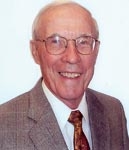Search
Dr. McClung passed away on Feb. 2 following a lifetime of work improving soils in the Cerrado
Des Moines, Iowa (Feb. 4, 2015) -- On behalf of all of the World Food Prize Laureates and our Council of Advisors, the World Food Prize Foundation extends its deepest condolences to Margo McClung and the family of Dr. Colin McClung, 2006 World Food Prize Laureate, who passed away on February 2, 2015.

Dr. Colin McClung
Dr. McClung was honored in 2006 together with Dr. Edson Lobato and H.E. Alysson Paolinelli for their collective and vital efforts in transforming the Cerrado – a region of vast, once infertile tropical high plains stretching across Brazil – into highly productive cropland. Although they worked independently of one another, in different decades, in the varied fields of soil science, agricultural extension, and government policy, their combined achievements unlocked the Cerrado’s tremendous agricultural potential, more than tripling Brazil’s food production during the last three decades of the 20th Century.
Dr. McClung’s research uncovered an innovative soil improvement process to correct the drastic nutrient depletion of the Cerrado and counteract aluminum toxicity in the region’s highly acidic soils. He concluded that, with a combination of lime, micronutrients and traditional fertilizer, the Cerrado could be made suitable for production of crops as diverse as coffee, soybeans, and citrus and corn.
Ambassador Kenneth M. Quinn, President of the World Food Prize Foundation, paid tribute to Dr. McClung.
“Dr. Colin McClung made a significant contribution to the single-greatest period of food production and distribution in human history, thus significantly reducing hunger and enhancing nutrition. Specifically, his pioneering soil fertility research analyzed the complexity of Cerrado soils and showed that a transformation of the region was possible. In addition, he was a vibrant and engaging person, who inspired the many students he encountered at Cornell University. His memory will be preserved both by the thousands of families and people of Brazil who benefited from his innovations, and here in the World Food Prize Hall of Laureates in Des Moines, Iowa.”
DR. MCCLUNG - LAUREATE BIO:
From only 200,000 hectares of arable land in 1955, the Cerrado had well over 40 million hectares in cultivation by the year 2005.
The phenomenal achievement of transforming the infertile Cerrado region into highly productive land over a span of fifty years, the world’s single largest increase in farmland since the settlement of the U.S. Midwest has been hailed as a far-reaching milestone in agricultural science.
Colin McClung began his career as an agronomy researcher at North Carolina State College in 1950 after earning degrees in agricultural science (West Virginia University, B.A., 1947) and soil science (M.S. 1949 and Ph.D. 1950, Cornell University).
In 1956, McClung joined the David and Nelson Rockefeller-funded International Basic Economic Corporation Research Institute (later known as the IRI Research Institute), which sought to improve soil conditions for coffee production and thus bolster the
Brazilian economy. As part of this project, McClung initiated research on the soil degradation plaguing central Brazil, including the 300 million-acre wasteland known as the Cerrado. McClung believed Brazil to have potential as “a world leader in
agriculture.” However, until his discovery of the proper application of lime and fertilizers to make its soils productive, the infertile Cerrado had been of little interest to Brazilian farmers, agribusinesses, or government officials.
McClung’s studies showed that acidity, toxic levels of aluminum, and deficiencies of several micronutrients in the soil limited plant growth. Given this analysis, he tested the potential of dolomitic lime to eliminate the aluminum toxicity of the soils, supply calcium
and magnesium, and modify the availability of other nutrients. Within a year, McClung’s laboratory, greenhouse, and field tests showed unprecedented promise for this treatment to support high corn, soy, and cotton yields on Cerrado soils – 200 to 300
percent higher than yields from unimproved soils. His groundbreaking results were presented at a meeting of the Brazilian Soil Science Society in 1957.
These findings “had a pronounced effect on food production,” said Professor Eugene Kamprath of North Carolina State University. Dr. McClung’s research did away with the myth that the Cerrado was not suitable for intensive agriculture and set off a chain
reaction of technical studies that increased food production and fueled substantial economic and social development in Brazil and other tropical countries.
Over the course of several decades and with the Brazilian government’s increasing support for agricultural research and extension, Brazil’s farmers began to apply McClung’s techniques throughout the Cerrado. In the five decades since McClung’s initial discovery, Brazil’s farmers have been able to produce sufficient crops not only to feed and sustain a population that has tripled to over 180 million people, but also to emerge as an international leader in agricultural production. Brazil currently ranks second in global production of soybeans – a crop whose yields in Brazil have increased 20 times since the development of the Cerrado and bring $9 billion to the Brazilian economy each year.
As he brought his technical skills to bear on the soil infertility problems, McClung also provided leadership in inviting collaboration from the private sector and local investors. He convinced many local enterprises such as lime producers, fertilizer companies, and
corn and soybean processors to provide funding, materials, and other resources to the research projects that he led.
“Dr. McClung’s research permitted the opening of an area larger than the total cropland of the United States to intensive agricultural production,” said Professor W. Shaw Reid of Cornell University, “and it has stood the test of time.”


